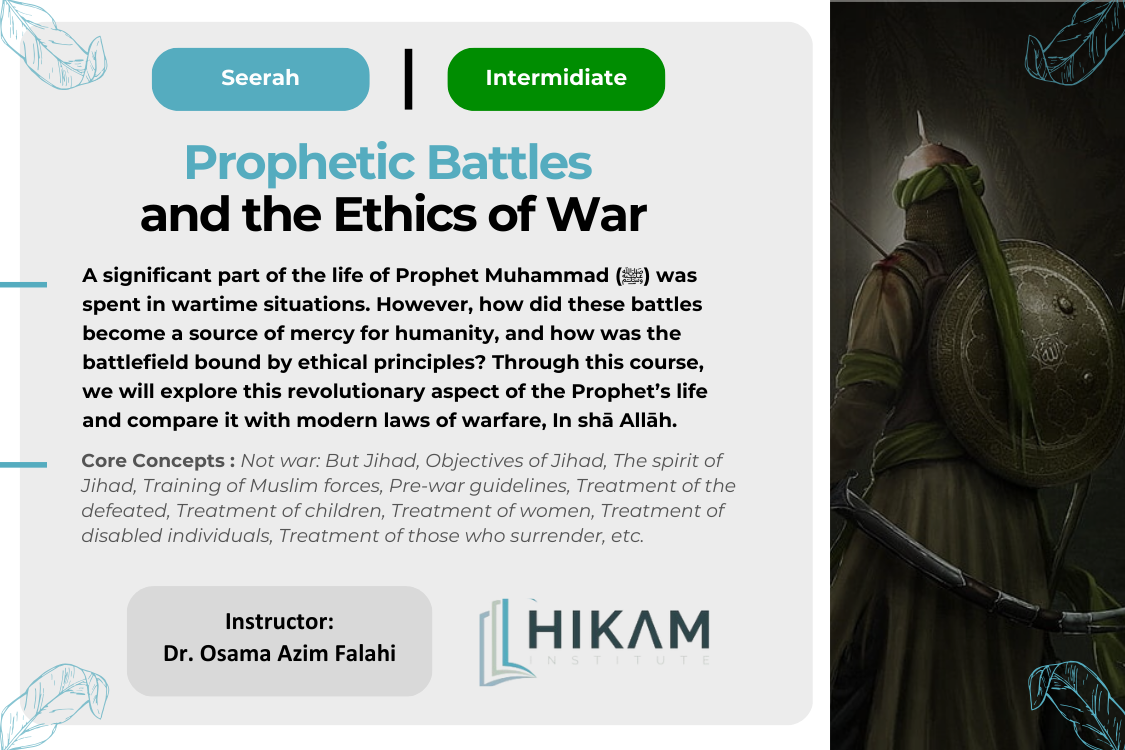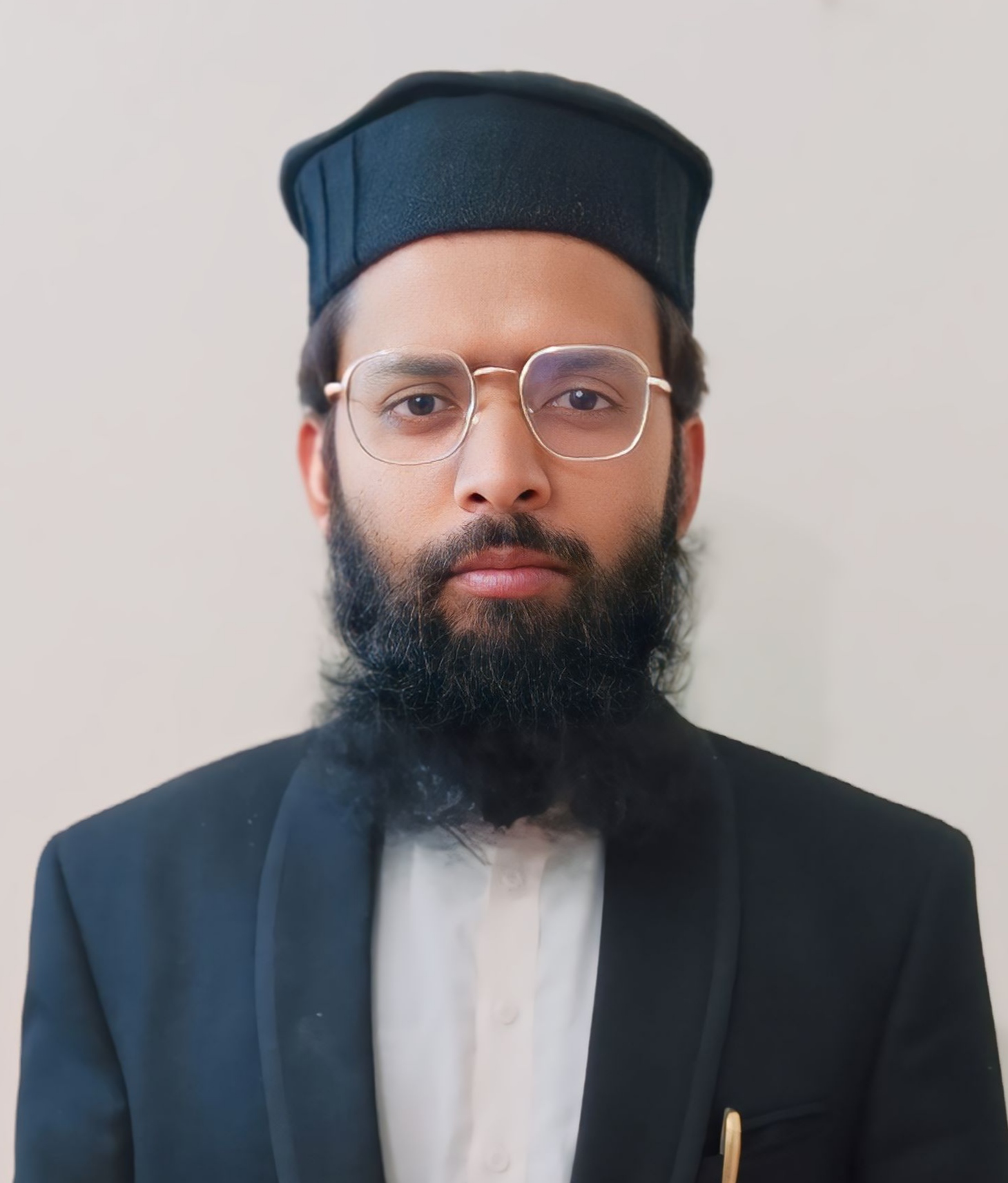Overview

Throughout history, the finest ideas, projects, and laws have been formulated for humanity’s well-being, yet without practical examples, they remain ineffective. Human nature seeks role models, and the Creator, knowing this, sent prophets as living embodiments of divine guidance. The final and ultimate model is Prophet Muhammad (ﷺ), the Seal of the Prophets, whose life serves as a comprehensive guide for all aspects of human existence, including war ethics.
While wars have existed before Islam, the Prophet (ﷺ) revolutionized warfare by introducing divine ethics, principles of justice, and rules of engagement. His battles were not fought for conquest or oppression but for the establishment of truth, justice, and the protection of faith. Despite the conflicts that occurred during his lifetime, the loss of life remained minimal compared to historical and modern warfare. His teachings emphasized mercy, discipline, and ethical treatment of prisoners, the wounded, civilians, and even the enemy’s dead.
About this course:
The entire life of the Messenger of Allah, Prophet Muhammad (peace and blessings of Allah be upon him), is not only a model for us but also the ultimate solution to the problems of all humanity. Today, efforts are being made at various levels to address regional and global crises. However, war and conflict continue to escalate, becoming more dangerous by the day. Despite numerous international conventions and organizations established to prevent war, powerful nations still use weaker ones for their own national interests, and the blood of humanity is spilled without restraint.
Due to the natural freedom granted by Allah, humanity has always been divided into two camps: one standing for truth and the other for falsehood, one for the oppressors and the other for the oppressed. As a result, wars have always existed and will continue to exist. How, then, could divine law (Shariah), which provides complete guidance for humanity, remain silent on such matters? Therefore, Allah made His final Prophet, the leader of all prophets (peace and blessings of Allah be upon him), an ideal example in this field as well.
The last ten years of the Prophet’s life were filled with military engagements. Yet, astonishingly, the revolution led by the Messenger of Allah resulted in barely a thousand casualties on both sides combined. These battles did not result in widespread destruction or loss of human resources. Instead, through them, the Prophet (peace and blessings of Allah be upon him) demonstrated a supreme code of ethics and morality in warfare, setting an unparalleled example for humanity.
It is essential to have an in-depth discussion on this aspect of the Prophet’s life and to present the true image of his noble conduct to the world. The study of the Prophet’s Ghazawat (battles) is of great importance, especially for those striving for the revival of Islam’s dominance. Through this course, we aim to explore and clarify this critical aspect of the life of the Messenger of Allah. Insha’Allah.
Curriculum
Course content:
- War and Human Nature
- War in the Light of Human History
- Wars Before the Prophet (ﷺ)
- Wars During the Jahiliyyah Period
- The Struggle for the Spread of Islam
- The Meccan Life: A Review
- The Establishment of the State and the Initial Causes of War
- Jihad, Not War
- The Prophet’s (ﷺ) Battles with the Arab Polytheists
- The Prophet’s (ﷺ) Battles with the Jews
- The Prophet’s (ﷺ) Battles with the Christians
- The Prophet’s (ﷺ) Battles with the Hypocrites
- The Ethics of War in the Prophet’s (ﷺ) Teachings
- The Training of Muslim Forces
- The Treatment of Prisoners
- The Treatment of the Wounded
- The Treatment of the Deceased
- The Treatment of Defeated Nations
- Fundamental Principles of War
- The Treatment of Children, Women, and the Disabled
- The Origins and Evolution of Modern Laws of War
- The Effectiveness of Current War Laws
- Why Have the Current Laws of War Failed?
- What Is the Solution?
Rules & Eligibility
Who is Eligible?
Any ordinary Muslim woman or man can participate in the course under the following conditions:
- They should have a digital device such as a smartphone or laptop with a good internet connection.
- They should be familiar with using the internet, know how to join platforms like Zoom or Google Meet and know how to turn on/off their microphone and video.
- They commit to attending two classes weekly, including making class notes, participating in classes, and taking exams.
- Enrollment in the course should be pursued with the sincere intention of completion, rather than for recreational or other purposes.
- They must have a basic understanding of everyday spoken Urdu.
Otherwise, they should have assistance to fulfill the above requirements.
Rules and Guidelines
General Rules:
- To be active during classes and maintain decorum.
- To be respectful of the sheikh and other members of the group.
- Refrain from personal quarrels, disputes, or comments during class.
- Interruptions should be avoided except for urgent matters; questions and answers will be addressed in the last 10 minutes of class.
- If you have difficulty understanding any of the points mentioned, please refrain from arguing. Instead, request a personal session with the Sheikh to clarify your doubts.
- Taking notes during class is mandatory.
Attendance guideline:
- Be present in class on time. In case of absence, submit a prior request for leave.
- If you have 15 consecutive absences in this course or are absent for 6 consecutive days, you will be expelled from the course.
- A delay exceeding 5 minutes after the class has commenced will be recorded, with three such delays counting as one absence.
Note: Attendance is considered a critical aspect of academic commitment at our institution.
Electronic device guideline:
- Microphones must remain muted during class unless activation is necessary for participation.
- Enter the classroom using the name with which you registered.
Food and drink guideline:
Consumption of food and drinks is not permitted during class, except for water.
DO NOT JOIN. —– IF
- If you are busy and can’t attend regularly.
- If you are not serious about completing the course.
- If you are just coming for a trial.
- If you can’t attend weekly tests and complete assignments.
- If you can’t make notes.
- If you don’t have proper internet connection and device.
Communication protocols:
- The teacher should be addressed only as ‘Sheikh.’ Do not use any other titles such as Teacher, Brother, Janab, Sir, etc.
- At the end of every class 10 minutes will be allocated for questions and answers can be submitted either by typing in the chat box or by speaking.
- If the Q&A session exceeds 10 minutes, you may request permission from the instructor to leave the class.
- If you have any questions or concerns from the previous week, or if your question remains unanswered during class, you may send a message to the following number or ask the teacher directly with their permission.
- Questions should be brief and accurate since the time for the Q&A session is limited.
Coordinators:
Ka’ab ibn Talha – 0091 9650498479
Timings: All days of the week (10:00 AM – 08:00 PM IST)
The Coordinator will make every effort to respond to you as soon as possible. However, depending on the nature of the question and time constraints, there may be a delay in the response.
Course Assessment:
- FINAL EXAM: 50 marks, (it may include multiple-choice questions or short-answer questions covering the entire course curriculum taught in class).
- VARIOUS ACTIVITIES: 50 marks, (attendance, participation, attention in class, completion of homework, and various assignments).
- To pass the course and obtain the certificate, it is mandatory to score a minimum of 60 out of 100.
Course Duration:
Total duration: 4 Months
Total weeks: 16 Weeks
Total sessions: 32 Sessions
Days: Thursday, Friday
Time (IST): 09:00 PM – 10:00 PM
Language of class: Urdu language.
Starting Date:
Required texts and resources:
- There is no textbook required as such, however, sometimes sheikh might ask to read specific articles.
- Notes are very important during class; this is the only source for exam preparation.
Course Fees
While many of our courses are free, this particular course requires a fee. The institution covers expenses such as teachers’ salaries through ongoing charity, and this fee ensures the sustainability of this specific program. Your contribution helps us continue providing high-quality education.
Admission Fee (One-Time Payment): 699/- Indian Rupees
- Note: Scholarships are available for those in genuine financial need. If you require assistance, please reach out to the administrator for further guidance. (Covered by Hikam Institute’s Charitable Trust)
Kindly contact the administrator to facilitate the payment of the fee: +919650498479
Instructor

Dr Osama Azim Falahi
He was born in the renowned city of Azamgarh in Uttar Pradesh, in the well-known village of Chanpatti. He received his Alim & Fazil degree from the prestigious institution, Jamiatul-Falah, in Northern India.and completed his graduation and post-graduation from various universities in India and obtained a Ph.D. in Religious Studies from Punjabi University,on the topic of " Human Dignity in Islam, with Special Reference to War Ethics in the Life of Prophet Muhammad (s)." He has a keen interest in Arabic language and religions and sects. Alongside being an accomplished speaker and reciter, he also serves as a educator, dedicating a significant portion of your time to student organization..
Email address: osamafalahi999@gmail.com
Time Zone: Indian Standard time.

